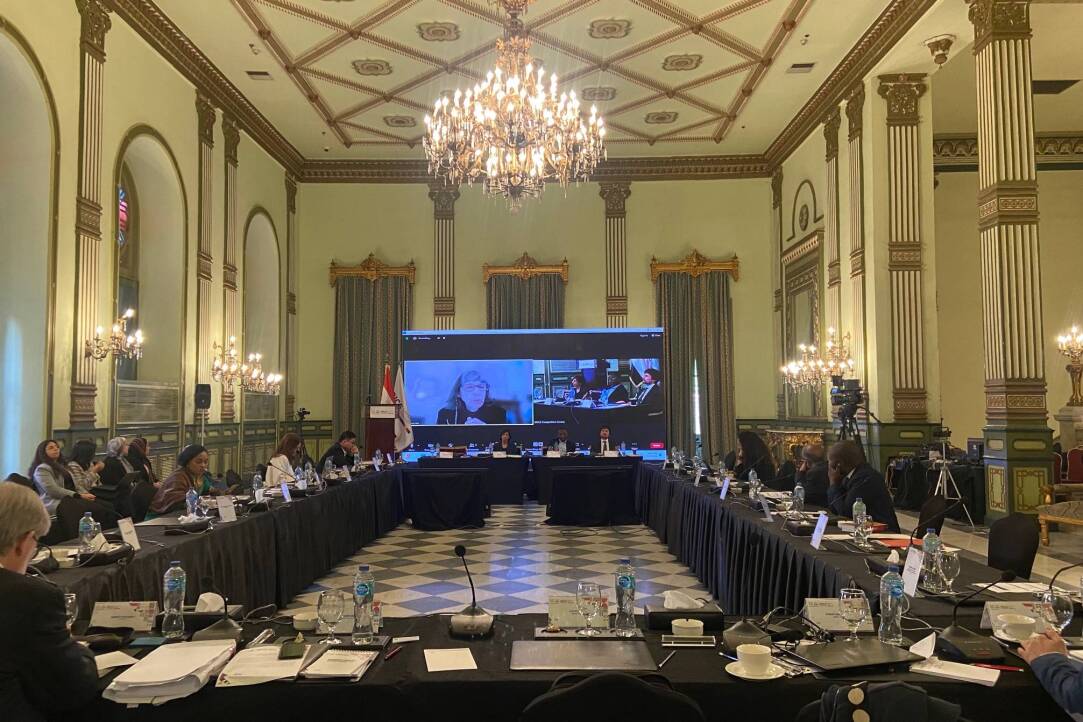BRICS Antimonopoly Authorities to Join Forces in Regulating Grain Markets

More than 70% to 80% of the calories we consume are derived from grain products. However, the global grain market today is dominated by a small group of traders. The HSE International BRICS Competition Law and Policy Centre has proposed establishing an intergovernmental BRICS platform on fair competition to serve as a new mechanism for coordinating the efforts of antimonopoly authorities in regulating global markets. This topic was discussed at an international seminar in Cairo.
The BRICS Competition Law and Policy Centre at HSE University (the BRICS Centre) has launched a series of seminars on global food value chains. The inaugural seminar, centred on grain trade, was held in Egypt, organised jointly with the Egyptian Competition Authority, with support from UNCTAD (United Nations Conference on Trade and Development).
The expert discussion was attended by the competition authorities and leading researchers from BRICS countries, Europe, and the United States, as well as representatives from international organisations such as FAO (Food and Agriculture Organisation of the United Nations) and COMESA (Common Market for Eastern and Southern Africa).

Day 2 of the seminar featured a meeting of the BRICS Working Group for the Research of Competition Issues in Food Markets, co-chaired by the FAS of Russia and the Competition Commission of South Africa. Egypt hosted the meeting as its inaugural event after joining BRICS as a new member.
Fostering fair competition in the food market is among the foremost challenges for Egypt and the wider region, according to Mahmoud Momtaz, President of the Egyptian Competition Authority. The country relies on grain imports and therefore needs a competitive global market; however, a few major players currently dominate the grain trade worldwide. He believes that the mechanisms of multilateral cooperation among countries—both consumers and producers of grain—require significant institutional upgrades, while the BRICS format presents unique opportunities for implementing proactive antimonopoly policies.

Mahmoud Momtaz
Mahmoud Momtaz emphasised that the BRICS Centre's proposals aimed at regulating the global food market have already influenced the work of competition authorities. The innovative approach which views food markets through the lens of global food supply chains has already started reshaping the practices of antimonopoly authorities. According to Mahmoud Momtaz, inclusive cooperation formats such as the BRICS Working Group for Food Markets hold significant value for competition authorities in Egypt and other countries in the region.
On the sidelines of the seminar, the FAS of Russia and the Egyptian Competition Authority signed a memorandum of cooperation and understanding.
As one of its central topics, the discussion addressed concerns over market concentration in the food industry, with a specific focus on the Bunge-Viterra deal (a merger of two major grain traders - Ed.) This merger reflects the current state of affairs in the global market and underscores existing gaps in the agricultural sector’s antimonopoly regulation.

Dina Waked
A large portion of the global grain trade is currently controlled by four major companies—Archer Danels, Bunge, Cargills, and Louis Dreyfuss—collectively known as the ABCD companies. Dina Waked, Professor of Law at Sciences Po, France, pointed out that the concentration of power and the financialisation of the market benefiting these companies contribute to extreme price volatility. Consequently, both ends of the food supply chain suffer disadvantages: on one side, farmers and small producers, and on the other, consumers. When prices are high, consumers bear the burden, but if antimonopoly authorities decide to lower the prices, it's the farmers who face the repercussions. She emphasised that the regulator's responsibility is to stabilise prices and mitigate volatility.
Dina Waked explained that global deals like Bunge-Viterra heighten volatility, because the intermediary gains even more market power.
The seminar also featured a presentation and discussion of the book 'Global Food Value Chains and Competition Law,' published by Cambridge University Press, edited by Alexey Ivanov, Director of the BRICS Competition Law and Policy Centre, Ioannis Lianos, Professor at University College London, and Dennis Davis, Professor at University of Cape Town. An international team of researchers, led by the BRICS Centre, conducted the study for the book. The outcome of their work has been a new methodological approach to market analysis.
It is essential that antitrust regulators should use the methodology in reviewing global transactions, according to Teresa Moreira, Head of the Competition and Consumer Policies Branch at UNCTAD.

Teresa Moreira
She suggested that the new methodology should be subject to a careful and thoughtful study, and UNCTAD could offer its platform for discussion and exchange of expertise.
According to Alexey Ivanov, Director of the BRICS Centre, a new methodological approach is necessary for monitoring changes and detecting systemic risks in the food market.

Alexey Ivanov
Antimonopoly authorities, he elaborated, must conduct a comprehensive analysis of the value chain, considering all its components—from the situation of farmers to the impact on consumers—and evaluate its performance holistically. Instead, the authorities often focus on a single element while neglecting potential systemic disruptions across the entire chain.
The proposed methodology could help identify the entire range of connections linking players in global food markets, added Ioannis Lianos, Professor of Global Competition Law and Policy at University College London.

Ioannis Lianos
He explained that shifting from the classical theory of price to a more complex system analysis could lead to a better understanding and more efficient tracking of competitive interactions among companies in the global value chain.
Professor Eleanor Fox of New York University highlighted the urgency of addressing the challenge of antimonopoly regulation in food value chains.

Eleanor Fox
She warned that the time to act is right now. There is a need to redirect the international discussion towards the challenges in food markets, much like it has been done with the digital sphere. The critical aspects to address include combating cross-border cartels, overcoming obstacles to sharing information among antimonopoly authorities, and scrutinising global transactions. Multinational companies operate on a global scale, unlike antimonopoly regulators. The latter must, therefore, elevate their efforts and collaborate to collectively address this global power, she argued.
One of the key conclusions from the seminar was the imperative need to consolidate the efforts of the antimonopoly community. To make a significant impact on a global scale, a coordinated approach to addressing the concerns in the grain sector is essential.

Hardin Ratshisusu
Hardin Ratshisusu, Deputy Head of the Competition Commission of South Africa, maintains that the BRICS platform, now uniting a substantial portion of developing countries, offers precisely such an opportunity. He believes that the BRICS Centre should play a pivotal role in organising and coordinating these efforts.

Tembinkosi Bonakele
However, the consolidation of efforts among antimonopoly authorities can only be achieved through close collaboration with the expert community. Food security is not merely a matter of competition, but a multidimensional and complex issue. For efficient functioning, antimonopoly authorities require the assistance of researchers, as regulators themselves cannot and will never transform into research centres due to time and resource constraints, reminded Tembinkosi Bonakele, professor at Wits University and former Commissioner of the South African Competition Commission.
Alexey Ivanov remarked that numerous research groups and institutes are currently working to fill the orders from international organisations associated with the West. As part of the BRICS Centre’s work, it is possible to undertake research on competition law and policy with a specific focus on addressing the needs of the BRICS member countries. Collaborative efforts of regulators and joint research initiatives can help overcome the existing limitations associated with specific local characteristics. An example of successful joint efforts has been the collaboration of BRICS countries’ authorities within the framework of the Working Group for Food Markets regarding the Bayer-Monsanto deal.

Andrey Tsyganov
In conclusion, Andrey Tsyganov, Deputy Head of the Federal Antimonopoly Service of Russia, called on his colleagues to further develop the BRICS institutional architecture pertaining to the antimonopoly track. He highlighted the urgency of establishing an intergovernmental BRICS platform on fair competition, drawing upon the expertise of the BRICS Centre and the BRICS working groups for food and various other markets. This platform could serve as a new mechanism for coordinating the efforts of antimonopoly authorities aimed at regulating global markets.
See also:
HSE Strengthens Cooperation with India and Creates Opportunities for Dialogue between Experts
Following the visit of the HSE University delegation to New Delhi, cooperation agreements with leading Indian universities were finalised. Similarly, a number of expert events, consultations and negotiations on the development of comprehensive strategic cooperation with Bharat took place. The HSE University delegation also participated in the Raisina Dialogue, one of the largest international expert forums.
HSE Hosts Round Table ‘Africa and BRICS: Reflections and Prospects’
On April 15, 2024 HSE University hosted a roundtable discussion ‘Africa and BRICS: Reflections and Prospects.’ The event featured leading experts from the South African Institute of International Affairs (SAIIA) Steven Gruzd and Gustavo de Carvalho and was moderated by HSE Vice Rector and Head of the BRICS Expert Council–Russia Victoria Panova.
Intellectual Property Issues in the Framework of BRICS Discussed at HSE University
On April 8, a roundtable discussion entitled ‘Intellectual Property on the Rise: How to Maximize Its Positive Impact and Avoid Hazards’ took place at HSE University in Moscow. The participants included Victoria Panova, HSE Vice Rector and Head of the BRICS Expert Council–Russia, andAlan Freeman, Co-Director of Geopolitical Economy Research Group at the University of Manitoba; Secretary of Geopolitical Economy Research and Education Trust; Co-Editor of Geopolitical Economy Book series, Manchester University Press.
‘The Goal of the Contest Is to Select Bold Ideas Aimed at Fostering a More Equitable Global Development’
HSE Vice Rector, Head of the BRICS Expert Council–Russia and Co-chair of the BRICS Civil Forum Victoria Panova, and Dean of the HSE Faculty of Humanities and Chair of the Contest Jury Felix Azhimov, announced the primary objectives of the contest, its format and potential participants during a press conference at TASS. Nationals from the BRICS countries, aged 18 to 45, are eligible to apply for participation in the contest. The jury will select ten winners, three of whom will be given the opportunity to attend the BRICS Civil Forum in Moscow in person.
‘We Have Promising Opportunities with Africa, and It Is Important to Foster Cooperation’
A Strategic Session focusing on cooperation between Russia and African countries in the sphere of higher education was held at HSE University's building on Pokrovsky Bulvar. The event was attended by representatives of HSE University, rectors of other Russian universities, and ambassadors and ministers of higher education from several African states.
‘Fine-Tuning the Molecule’: Prospects for Biosimilar Market in BRICS Space
The market for biological products and their analogues is one of the most promising in the pharmaceutical industry. BRICS countries currently have great opportunities to develop this segment. The International BRICS Competition Law and Policy Centre at HSE University, together with the Institute of Chemical Technology, Mumbai, held a meeting of the BRICS Working Group for the Research of Competition Issues in Pharmaceutical Markets.
HSE University Hosts the First Meeting of Russian NGO Representatives as Part of BRICS Civil Track
More than 50 representatives of non-profit organisations took part in the meeting, where they discussed the event plan for 2024 and thematic areas of activity of the working groups of the BRICS Civil Forum, scheduled to be held in Moscow in July 2024. The BRICS civil track’s operations are coordinated by the BRICS Expert Council–Russia.
BRICS Expert Council–Russia Launched at HSE University
The official presentation of the BRICS Expert Council – Russia has taken place at HSE University. The Council will be responsible for the information, analytical and expert support of the Russian BRICS Chairship 2024.
Experts from HSE University Explore Prospects for Carbon Farming in Kazakhstan
HSE University’s International BRICS Competition Law and Policy Centre and the university’s Centre for Technology Transfer, together with the International Institute for Applied Systems Analysis (IIASA, Vienna), have released a draft version of the research report ‘The Carbon Farming Industry in Kazakhstan: Unlocking Opportunities.’ Experts from the UN Convention to Combat Desertification and the Kazakhstan-based TALAP Centre for Applied Research also took part in the project.
‘Seeing Moscow Ranked First among the Cities of BRICS Countries Is Pleasant, but Not Surprising’
An international consortium of research organisations from China, India, and Russia, including HSE University’s Faculty of Urban and Regional Development represented by experts from the Vysokovsky Graduate School of Urban Studies and Planning and the Centre for Social Research and Technological Innovation (CITY), is developing an index of technological and spatial urban development (the Urban & Innovation Environment Index). Recently, a list of the top 10 largest cities of the BRICS countries was published on the project’s website. The Russian capital took the first place in the ranking, followed by Beijing, Shanghai, Sao Paulo, and Guangzhou.


